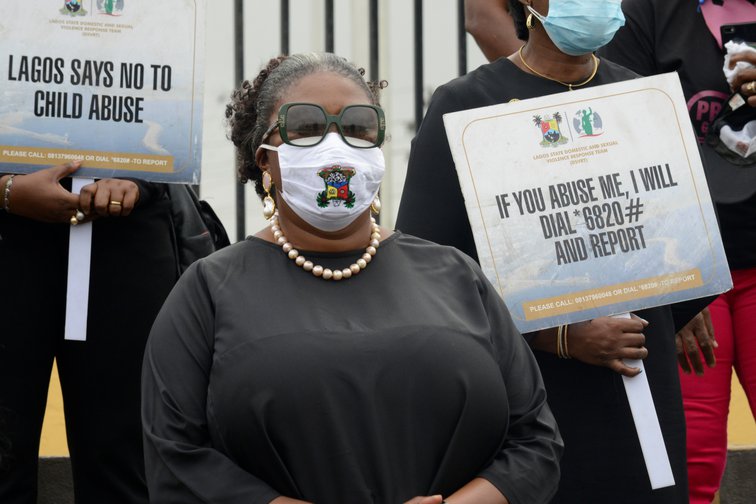Nigerian human rights advocates explain why castrating rapists is the wrong strategy
A Nigerian state has introduced sterilisation and death as a penalty for child rape. Local rights advocates explain what should happen instead.

After a rise in reported rapes during last year’s coronavirus lockdown, one state in Nigeria responded by announcing a severe new form of punishment. In September, the north-western Kaduna state introduced sterilisation as a penalty for child rape.
Under the new law, men convicted of the crime will be surgically castrated, while women will have their fallopian tubes removed, a procedure known as salpingectomy. If the victim is aged under 14, the punishment will be followed by the death penalty. If they are over 14 years old, the penalty is life imprisonment.
Critics say that the new law is cruel – and that it also will be ineffective in preventing rape and sexual violence, which requires a different approach.
Inibehe Effiong, a Nigerian human rights lawyer, told openDemocracy that “castration involves the infliction of grievous pain and injury”. Also, in reality, such punishments won’t be implemented quickly because convicts would have the right to appeal: “Until the right of appeal is exhausted, [punishments] cannot be carried out.”
There are many problems with how the Nigerian police and legal system respond to rape cases, Effiong added. “A regular policeman will treat cases of rape with levity. They will demand the victim fund the investigation through bribing,” he explained.
Even when cases are prosecuted, they’re almost impossible to win. The law requires corroborating physical evidence, and this, says Effiong, “cannot be achieved without the necessary infrastructure, technology and [forensic] science”.
Faith Kalagbor, a spokesperson for the Nigerian human rights group Alliances for Africa (AfA), said that while reported cases of rape grew during lockdown – her organisation counted more than 100 incidents between March and December 2020 in Imo state alone – “sexual violence was undoubtedly there before the virus”.
A culture of silence around rape is a key obstacle to accessing justice
In Nigeria’s most recent national demographic and health survey (2018), 9% of women aged 15–49 said that they had experienced sexual violence in their lifetimes, with 4% reporting it as an experience over the last year. Of those women who had experienced sexual violence, 44% said it had happened before they turned 18.
With 42.5 million Nigerian women in the 15–49 age group, these figures suggest that in 2017 there were at least 1.6 million women in Nigeria who had recently survived sexual violence. But the Nigerian police recorded fewer than 2,300 cases of rape and indecent assault in the same period, according to a BBC report.
Stigma enables a culture of silence around rape, warn rights advocates, who say this is a key obstacle to accessing justice. “This is a fight that goes beyond the law. We have to change the mould of thinking and the mindset of people,” Kalagbor argued.
Other research has shown that many assaults are carried out by family members or close acquaintances – a factor that may make survivors of this violence reluctant to see either sterilisation or a death sentence carried out as punishment.
In one recent study, researchers analysed 331 rape cases reported by two major Nigerian newspapers in the past five years. They found that 46% of the victims were aged between 11 and 20, and that the perpetrators were often “fathers, step-fathers, uncles, friends, family friends, cousins, grandfathers, and the clergy”.
Sex education not stigma
Amarachi Mbagwu, a writer who is also a survivor of rape, believes that rapists should be punished – saying that “for every rapist that escapes punishment, more lives are threatened”. But she said this can be difficult in Nigeria where traditional and religious beliefs focus on purity, meaning that survivors are stigmatised or blamed.
“Nigeria’s society thinks of every female rape victim as a lesser woman. A woman who is no longer fit for marriage. It is going to take a while before the victimisation and stigma reduces in Nigeria,” said Mbagwu. She believes that education should be at the centre of conversations to reduce sexual violence. In Nigeria, she says, “there is no sex education or it is wrongly taught”.
Elijah Mhlanga, spokesperson for South Africa’s education ministry, recently told openDemocracy that sex education “builds resilience, confidence and assertion among young people, who often do not know when they are being violated”. (He was commenting on a campaign by a US right-wing Christian group to ban comprehensive sex education in at least ten African countries, including Nigeria.)
Many Nigerian activists say a good first step towards addressing widespread sexual violence would be to nationalise the Violence Against Persons (Prohibition) Act, which currently applies in only 14 of Nigeria’s 37 states. The Act expands the meaning of rape to include male rape, and includes provisions to help ensure perpetrators are brought to justice, and survivors are adequately supported.
Alliances for Africa is currently working with legislators in Nigeria’s national parliament to get this law adopted country-wide.
Before Kaduna state passed its sterilisation law, chemical (and sometimes surgical) castration of sex offenders was already authorised in the Czech Republic, Indonesia, Ukraine and the US state of Alabama. Days after the Kaduna announcement, Imran Khan, Pakistan’s prime minister, called for the public hanging and castration of rapists. In October 2020, Bangladesh introduced the death penalty for rape.
The UN’s High Commissioner for Human Rights, Michelle Bachelet, is among the international figures who have condemned the Kaduna state law.
Sterilisation is “cruel and inhuman” and in violation of international human rights protections, Bachelet said in a statement last year. “Tempting as it may be to impose draconian punishments on those who carry out such monstrous acts,” she argued, “we must not allow ourselves to commit further violations.”

No comments:
Post a Comment
Note: only a member of this blog may post a comment.